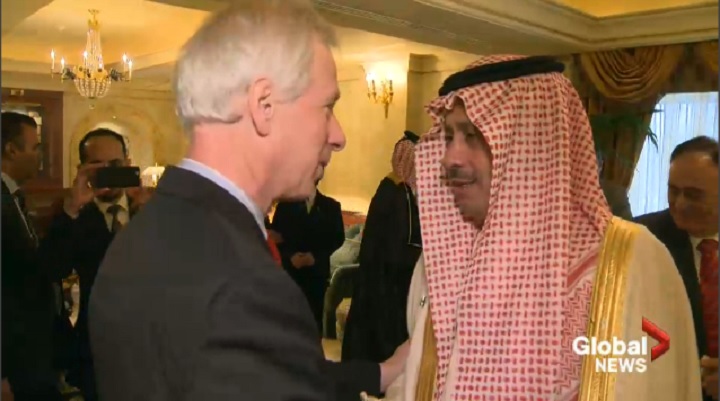It won’t have any affect on Saudi Arabia’s human rights record.

There would be financial penalties and job losses.
It would compromise Canada’s business reputation.
It’s too late to back out.
At one point or another, the Liberal government has used all of these explanations to defend its decision to move ahead with a $15-billion sale of light armoured vehicles to Saudi Arabia that was first approved under the Conservatives. But are these the real reasons?
READ NOW: Saudi Arabia thanks Canada for helping Syrian refugees. But how much is it doing?
On Tuesday evening, The Globe and Mail published details of a secret departmental memo that shines a light on the government’s motivations. Global News obtained a copy on Wednesday. Here’s a look at what we now know:
Too late?
At least one of the explanations — the notion that Canada had gone too far down the path to turn back — has been blown out of the water. The government memo proves that Foreign Affairs Minister Stéphane Dion only recently issued export permits tied to the sale.

Dion personally approved export permits covering more than 70 per cent of the transaction just last week, meaning the deal was far from done up to that point. Export-permit approval is perhaps the most critical step in the process, because it means Ottawa has officially sanctioned the shipment of parts and equipment out of the country by the manufacturer of the vehicles, General Dynamics Land Systems.
“It’s a done deal in that the contract has been signed,” Dion explained to reporters on Wednesday afternoon.
But NDP Leader Tom Mulcair didn’t mince words.
“The government lied to Canadians,” he said.
No affect on human rights?
The departmental memo prepared for Dion highlights repeatedly that while there have been proven human rights violations by Saudi Arabia, there is no evidence to suggest that previous shipments of light armoured vehicles (or LAVs) from Canadian manufacturers to the country have been used to violate or suppress the rights of its residents.
“Based on the information provided,” the memo notes, there is no reason to believe the new vehicles would be used for those purposes either. In fact, staff explain, they could contribute to Saudi Arabia’s fight against terrorist groups like ISIS and assist in countering instability in Yemen.
WATCH: Executions in Saudi Arabia spark global outrage

In that sense, Dion’s assertion that cancelling the new LAVs “would not have an effect on human rights in Saudi Arabia” is accurate, but only to the best of his department’s knowledge.
READ MORE: Dion breaks bread with Saudi ambassador, but ‘can’t reveal nature of discussion’
Staff preparing the memo noted that Global Affairs consulted with a variety of other government departments, including the Department of National Defence and Innovation, Science and Economic Development Canada, before drafting the advice for Dion.
They did not consult human rights groups, which, according to Amnesty International Canada, is not unusual.
Hilary Homes, Amnesty’s spokesperson on the arms trade, said her organization does at least hope that its evidence surrounding human rights violations in Yemen were examined.
There is “mounting evidence” of such violations on the ground in Yemen, she said, and the government’s current reliance on the Saudi Arabian-led coalition’s own assurances that it is respecting human rights law is not reassuring.
“We’ve gone through decades of looking at diplomatic assurances around torture, and just like those, it can’t be trusted,” Homes said.
“Given the way forces are conducting themselves in that conflict … anything you sell those parties in the context of the conflict, we don’t feel confident that they will use it properly.”
Financial penalties and economic fallout
If Canada puts a stop to the deal, Dion has argued, “we’d have to pay penalties for it” and “it would put people out of jobs.”
The penalties part is likely true, but the precise cost of pulling out has not been made public. In 1993, former prime minister Jean Chrétien cancelled a controversial helicopter contract and paid about half a billion dollars in penalties.
WATCH: Trudeau defends honouring Saudi Arabia arms deal contracts

Based on the documents, diplomatic relations and economic considerations are what’s really at the core of the government’s choice to approve the export permits and allow the deal to move ahead.
“Saudi Arabia is a key partner for Canada, and an important and stable ally in a region marred by instability, terrorism and conflict,” the memo states. “Saudi Arabia is also Canada’s largest two-way trading partner in the Middle East and North Africa region.”
At home in Canada, and especially in southern Ontario, General Dynamics Land Systems “anchors Canada’s defence industry cluster,” the document says, and provides work for hundreds of secondary suppliers.
There are no firm numbers provided in the document for how many jobs might be lost if the Saudi contract doesn’t move ahead, however.
Advantages for the Armed Forces
Global Affairs staff were careful to note in their briefing to Dion that General Dynamics Land Systems is also a major supplier for the Department of National Defence. Any financial hit could therefore cause problems for Canada’s own defence procurement strategy.
But if the contract goes ahead, the memo says, then the Canadian Armed Forces will be able to take advantage of “economies of scale for production and technical developments,” saving the government money.




Comments